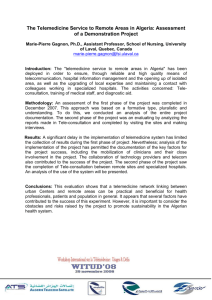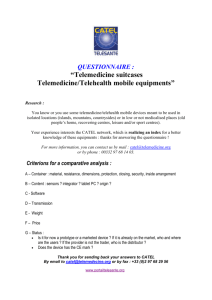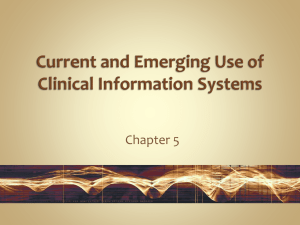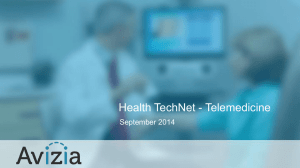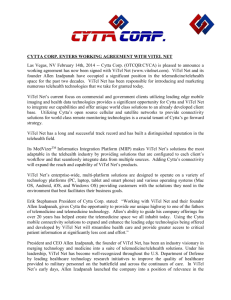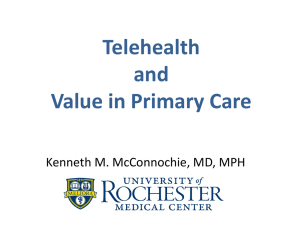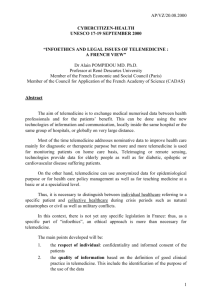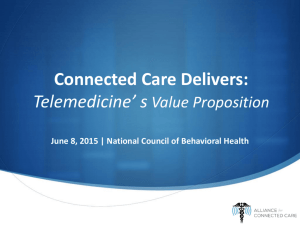Telehealth 101: the fundamentals
advertisement
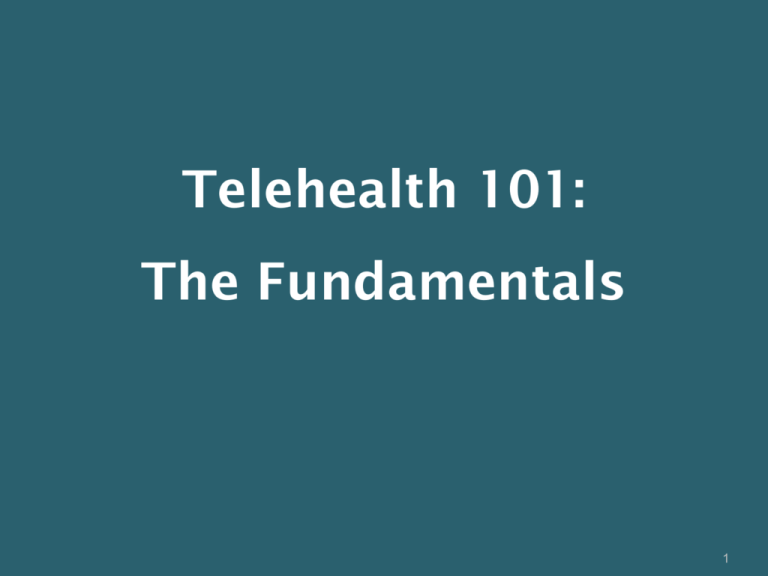
Telehealth 101: The Fundamentals 1 Can you imagine what health care would look like if… …. clinical care was available anytime and anywhere …. clinicians could obtain consultations with medical centers of excellence anytime and anywhere …. home bound patients could be monitored remotely anytime and anywhere …. medical education programs were available anytime and anywhere This is the potential of telehealth 2 © California Telemedicine & eHealth Center 2008. Please request permission to use. Photos used with permission. February 2008 Telehealth: The Vision for America No matter who you are or where you are you can get the health care you need when you need it 3 Telemedicine Telehealth What’s the Difference? 4 What Is Telemedicine? Clinical care provided from a distance The use of electronic communication and information technologies to provide or support clinical care Primary Care Medical Specialties Intensive Care Services Emergency Departments 5 Telehealth vs. Telemedicine Telehealth Regional Health Information Sharing Health Professions Education Administration Telemedicine Evaluation Research Consumer Education Public Health Homeland Security 6 The Need for Telehealth Clinician shortages Misdistribution of providers Rural/Urban underserved Aging population Travel time, cost & hardship Delayed treatment Language barriers Clinical education programs Administrative meetings 7 © California Telemedicine & eHealth Center 2008. Please request permission to use. Photos used with permission. February 2008 Telehealth Benefits Reduces barriers to access Increases efficiency for providers Reduces overall health care costs Reduces delays in care Retains resources locally Increases patient satisfaction Improves quality of care Consultant and primary provider communication Education to providers Improves health outcomes Virtual accessibility 8 © California Telemedicine & eHealth Center 2008. Please request permission to use. Photos used with permission. February 2008 Most Common Uses Clinical Services Educational Programming Administrative Meetings 9 What is the Technology Principal components Equipment Connectivity Two Technology Approaches Live Interactive Store and Forward Tandberg Telemedicine Unit 10 © California Telemedicine & eHealth Center 2008. Please request permission to use. Photos used with permission. February 2008 Telehealth System Models Statewide University Based Systems Regional Networks Large Healthcare Individual & Small Group Practice 11 Different Approaches for Various Needs Live Interactive Store and Forward Emergency Response Patient Education Kiosks Home Health Monitoring Educational Services Videoconferencing Polycom Telemedicine Unit 12 © California Telemedicine & eHealth Center 2008. Please request permission to use. Photos used with permission. February 2008 Live Interactive Telemedicine Patient visits using videoconferencing where patient & provider are communicating in real time. Allows provider to assess patient using medical scopes adapted for image transmittal Specialty services Dermatology Urology Psychiatry Orthopedics Neurology Pain Management Endocrinology ENT Rheumatology Georgia Rural Health Care Initiative 13 © California Telemedicine & eHealth Center 2008. Please request permission to use. Photos used with permission. February 2008 Other Great Uses For Live Interactive Dental Services Connecting friends & family Family Counseling Support Groups Patient education Sacred Heart Hospital Telestroke Program Pensacola Florida Administrative Meetings 14 © California Telemedicine & eHealth Center 2008. Please request permission to use. Photos used with permission. February 2008 Live Interactive Telemedicine Can be applied in many situations and locations • Outpatient Clinics • Mental Health Centers • Intensive Care Units • Correctional Facilities In Touch Health • • • Emergency Departments Emergency Transport Units Surgery Suites Minnesota Telehealth Network Wadena 15 © California Telemedicine & eHealth Center 2008. Please request permission to use. Photos used with permission. February 2008 Mobile Live Telemedicine Unit Oklahoma State University Center for Health Sciences Telemedicine Bus The Oklahoma State Mobile Telemedicine Clinic began operation in March 2007 The mobile telemedicine unit also coordinates with emergency organizations on disaster response 16 © California Telemedicine & eHealth Center 2008. Please request permission to use. Photos used with permission. February 2008 Emergency Medical Services Using Telemedicine General Devices EMS System Polycom Mobile Responder The City of Tucson will soon initiate telemedicine in citywide ambulance service 17 © California Telemedicine & eHealth Center 2008. Please request permission to use. Photos used with permission. February 2008 Live Interactive Teledentistry Children’s Hospital of Los Angeles Children School Sites 18 © California Telemedicine & eHealth Center 2008. Please request permission to use. Photos used with permission. February 2008 Disaster & Emergency Preparedness/Response Loma Linda University Mobile Telemedicine Vehicle Telemedicine via Satellite 19 © California Telemedicine & eHealth Center 2008. Please request permission to use. Photos used with permission. February 2008 Video Interpretation Services Improve Quality of Care – Avoid Medical Errors Multilingual Culturally Competent Trained in Medical Terminology Meet legal/contract requirements Photo courtesy of Pine Tree Society, Maine Learn more www.pinetreesociety.org 20 © California Telemedicine & eHealth Center 2008. Please request permission to use. Photos used with permission. February 2008 Telepharmacy 21 Store and Forward When a face to face visit is not necessary Diabetic Retinopathy Screening Round Valley Indian Health Service Second Opinion Dermatology System Images are obtained at a local care center and transmitted for review by a clinician at a remote site Picture and history adequate for diagnosis Allows clinician to do work when convenient Maximizes use of clinician time 22 © California Telemedicine & eHealth Center 2008. Please request permission to use. Photos used with permission. February 2008 Patient Education Kiosks Mee Memorial Hospital Greenfield, California 23 © California Telemedicine & eHealth Center 2008. Please request permission to use. Photos used with permission. February 2008 Home Health & Monitoring Technology that supports monitoring of chronic conditions COPD – peak flow Diabetes Health Hero Courtesy of American Telecare Visiting Nurse & Health Services of Connecticut 24 © California Telemedicine & eHealth Center 2008. Please request permission to use. Photos used with permission. February 2008 Provider & Patient Education Allows clinical staff to participate in educational programs without leaving their communities Courtesy of University of California Davis Allows patients to receive health education and health counseling services. 25 © California Telemedicine & eHealth Center 2008. Please request permission to use. Photos used with permission. February 2008 Administrative Meetings Administrators, providers and others in many locations can more efficiently hold administrative meetings. 26 © California Telemedicine & eHealth Center 2008. Please request permission to use. Photos used with permission. February 2008 Reimbursement Medicare Medicaid Private Payors • Blue Cross / Blue Shield State Initiatives 27 Legal Aspects Intellectual Property Rights Risk Management Credentialing and Privileging Interstate Licensure Telecommunications Law Privacy Fraud and Abuse 28 Technology Alone Does Not Produce Success Some success factors Champion Coordinator Education and training Engagement of primary care providers Availability of services Technical and program support Stable technology Funding & reimbursement mechanisms 29 Challenges Reimbursement Physician Champions Institutional Buy-in Convenience Telecommunications Costs Trade-offs Program Sustainability Credentialing, Privileging & Accreditation 30 Assistance Is Available! Federally Designated Telehealth Resource Centers Put in all logos 31 Telehealth Resource Centers 32 Program Support & Assistance Assist health care organizations, networks and providers to implement cost-effective telehealth programs. Serve as a focal point for advancing the effective use of telehealth technologies. Equipment Options Practice Guides Program Design Reimbursement Business Models 33 © California Telemedicine & eHealth Center 2008. Please request permission to use. Photos used with permission. February 2008 Telehealth Resource Centers Web Sites National Telehealth Resource Center www.telehealthlawcenter.org California Telemedicine & eHealth Center www.cteconline.org Great Plains Telehealth Resource & Assistance Center www.gptrac.org Midwest Alliance for Telehealth and Technology Resources www.midwesttrc.org Northeast Telehealth Resource Center www.northeasttrc.org Northwest Regional Telehealth Resource Center www.nrtrc.org 34 Univ. of Arkansas for Medical Sciences Georgia Partnership for Telehealth University of Hawai’i University of Kansas Medical Center California Telemedicine & eHealth Center 2007 35 Other Resources Coming soon: OAT Portal Current OAT Website www.hrsa.gov/telehealth American Telemedicine Association www.atmeda.org/ Telemedicine Information Exchange www.tie.telemed.org/default.asp 36
